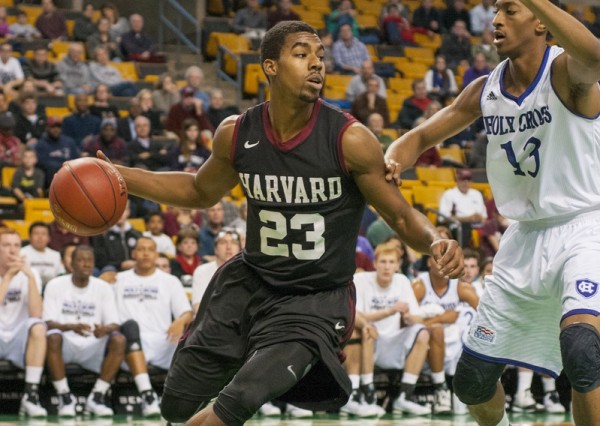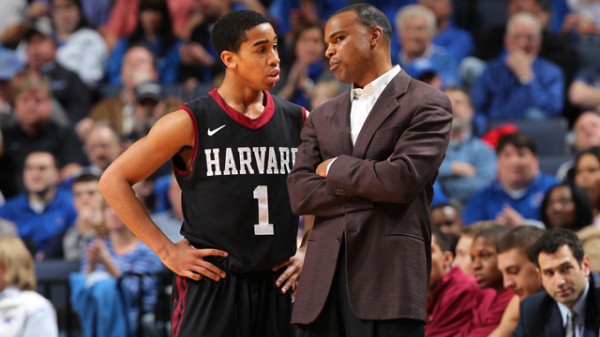Harvard’s Wake-Up Call Might Not Be So Bad
Posted by Tommy Lemoine on November 20th, 2014Let’s make a few things clear about Harvard and its probably-gone at-large hopes. For one, if the team is worrying about an at-large selection come March, it probably means it lost two or three games in Ivy League play – which would be problematic on its own. For another, Tommy Amaker’s group is no stranger to faltering unexpectedly in the non-conference: in 2012, the Crimson lost to Atlantic 10 bottom-feeder Fordham; in 2013, it fell at home to Vermont; and last season, it suffered a 15-point defeat to sub-.500 Florida Atlantic. Each year, Harvard’s at-large aspirations took a severe hit before conference games even began, and each year the team responded by winning the outright Ivy League title. Sunday’s turnover-filled loss to Holy Cross is only different in that it happened just three days into the season, before anyone could even blink. With everything still left to play for – a league title, a Tourney birth, seeding implications – the much-hyped Crimson may have received the wake-up call it needed and was eventually going to get anyway. Now it must figure things out on the court before the schedule ramps up in coming weeks.

Harvard needs to bounce back after falling to Holy Cross on Sunday. (Robert F Worley/The Harvard Crimson)
Siyani Chambers is probably the best point guard in the Ivy League yet the Crusaders’ pressure defense completely got the best of him on Sunday, turning him over a career-high nine times and holding the junior to just one point. As poorly as Chambers played, though, his track record suggests that he’ll be just fine going forward; the bigger problem might be his backcourt running mates, or lack thereof. Both he and Ivy League Player of the Year Wesley Saunders (24 points and 12 rebounds on Sunday) are going to play a lot and produce a lot, but nearly every other guard is an unproven commodity. Program mainstays Laurent Rivard and Brandyn Curry graduated in the offseason, stripping the team of its best perimeter shooter (Rivard shot 43% 3FG as a senior and holds the school’s all-time three-point record) and a solid all-around guard who could spell Chambers at the point (Curry was the team’s floor general before Chambers arrived in 2012). Corbin Miller (45% 3FG in 2011-12) – who missed the past two years due to an LDS mission – should fill some of the void left by Rivard, but true freshman Andre Chatfield looks like the only other guard receiving rotational minutes early on. As a result, not only is Harvard very thin in the backcourt from an injury-risk standpoint – losing Chambers, Saunders or Miller would be devastating – it also seems less-equipped to handle opponents that necessitate a guard-heavy lineup like Holy Cross. Too much pressure was placed on the pair in that game. Amaker has a ton of options when it comes to mixing and matching frontcourt guys, but far fewer when it comes to the backcourt, so the continued development and emergence of players like Miller and Chatfield will be crucial as the season progresses.
Personnel concerns aside, though, the effect of Sunday’s loss could be more psychological than anything – quite possibly in a good way. After months of hype, Harvard began the year ranked in the preseason AP Top 25 for the first time in school history, an impressive honor that was immediately and (likely) permanently taken away. Now, the Crimson finds itself in the familiar position of being an assumed-Cinderella threat in March, but still having to withstand the grind of the Ivy League season – having to win the “14-game tournament” – just to secure an NCAA Tournament bid. Likewise, Amaker’s club probably realizes its now-limited margin for error in terms of seeding potential. Like all one-bid leagues, the Ivy representative’s NCAA Tournament seed “ceiling” is partially based on luck (will there be quality RPI wins available once conference play begins?) and partially based on non-conference performance. With upcoming games against teams likes Houston, Massachusetts, Northeastern, Virginia and Arizona State, Harvard knows that it must capitalize on every winnable opportunity. The higher the team’s eventual seed, the more favorable the match-ups, and the better opportunity there will be to win NCAA Tournament games – something the Crimson has made a habit of in recent seasons.
The Ivy front-runners are too talented to not find their footing this season, but whether they can do so before several key non-conference match-ups remains to be seen. Harvard plays Florida Atlantic in a revenge spot tonight and Houston on Tuesday, before UMass – which looks very tough in the early going – heads to Cambridge over Thanksgiving weekend. Beat the Minutemen; take care of business against teams like Vermont and Northeastern; perhaps split against Virginia and Arizona State; and pretty soon people will forget about Holy Cross altogether. Considering how the Crimson has responded in recent years, maybe early-November losses aren’t such a bad thing.










































